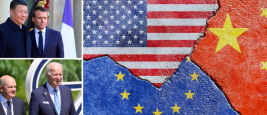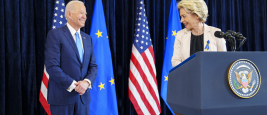Mathilde VELLIET
Research Fellow, Geopolitics of Technology Center
Research interests:
-
American and Chinese technology strategies (export control, industrial and innovation policies, economic diplomacy
-
U.S.-China relations
-
American foreign policy
Mathilde Velliet is a Research Fellow at Ifri's Geopolitics of Technology Center since September 2021. Her research focuses on international issues related to new technologies, particularly American and Chinese technology policies as well as U.S.-China relations. She is also a PhD student in American civilization at the University of Paris and the University of Aix-Marseille. Her doctoral thesis deals with U.S. policies to protect strategic technologies in response to the China threat under the Obama, Trump and Biden administrations.
She holds a Master’s degree in English studies from the École Normale Supérieure de Lyon and a Master’s degree in International Security from Sciences Po Paris. She also conducted research at New York University and Boston University.
In a continuation of U.S. efforts to slow China's development and acquisition of strategic technologies, Washington has imposed new restrictions on American investment in Chinese technology sectors such as artificial intelligence (AI), quantum, and semiconductors.
As French President Emmanuel Macron (accompanied by Ursula von der Leyen) is on a state visit to China, some twenty Ifri researchers decipher the stakes of the U.S./China/Europe strategic triangle.
European digital sovereignty has been made a priority by Ursula von der Leyen’s European Commission. Due to the privileged position of American companies in the European market, Brussels’ efforts towards digital sovereignty (on privacy, antitrust, data sovereignty, etc.) are closely...
In line with the anti-Huawei diplomatic campaign of the Trump and Biden administrations, the United States has promoted an alternative: Open RAN, a concept defined by "open" network architectures. At the intersection of 5G geopolitics and standards, what risks and opportunities does Open RAN...
The tough-on-China policy adopted by the Trump and Biden administrations has – and will increasingly have – important consequences for Washington’s allies, both on their infrastructure choices (5G, submarine cables...) and on their technological exchanges with China.
China has just announced controls on exports of rare minerals - gallium and germanium - whose production it dominates and which are essential for the manufacture of electronic components.
In a typically French move, France's top lawmakers are refusing to side with the United States and single out China's TikTok.
The United States are ramping up its efforts to deny China access to the most advanced semiconductors powering smartphones, personal computers and the latest generation of supercomputers.
Disagreements have opened up about strategy when China is also seen as an existential threat. Western powers in the G7 group of nations are failing to coordinate their China strategies, senior western officials admit, adding that the need to do so has been given sharp impetus by Xi Jinping’s...
Following assertions of OpenRAN solutions offering costs cuts and shortcuts to 5G and even claims of superior security, a series of reports from governments, scientific labs, security expert and think tanks investigate the technology. They showcase perspectives from the United State,...














